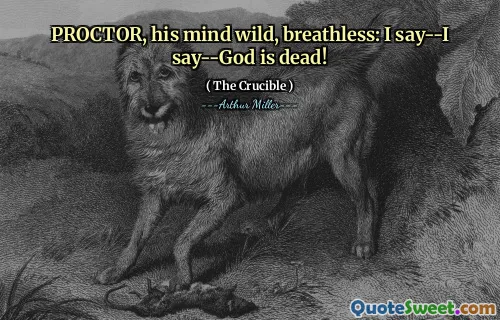
PROCTOR, his mind wild, breathless: I say--I say--God is dead!
In Arthur Miller's play "The Crucible," a pivotal moment occurs when Proctor, overwhelmed by his experiences and the chaos around him, exclaims, "I say--I say--God is dead!" This declaration captures the essence of his emotional turmoil and disillusionment. Proctor's cry signifies not just personal despair but also a broader commentary on the moral and social decay present within the society plagued by hysteria and unreasoned fear. This shocking statement reflects Proctor's struggle against the oppressive forces of the witch trials, where truth is sacrificed for self-preservation. As he grapples with his own guilt and the hypocrisy around him, his proclamation serves as a painful acknowledgment of the loss of integrity and spirituality in a world consumed by paranoia. Through this, Miller illustrates the dangers of fanaticism and the impact of mass hysteria on individual conscience.
In Arthur Miller's play "The Crucible," a pivotal moment occurs when Proctor, overwhelmed by his experiences and the chaos around him, exclaims, "I say--I say--God is dead!" This declaration captures the essence of his emotional turmoil and disillusionment. Proctor's cry signifies not just personal despair but also a broader commentary on the moral and social decay present within the society plagued by hysteria and unreasoned fear.
This shocking statement reflects Proctor's struggle against the oppressive forces of the witch trials, where truth is sacrificed for self-preservation. As he grapples with his own guilt and the hypocrisy around him, his proclamation serves as a painful acknowledgment of the loss of integrity and spirituality in a world consumed by paranoia. Through this, Miller illustrates the dangers of fanaticism and the impact of mass hysteria on individual conscience.
